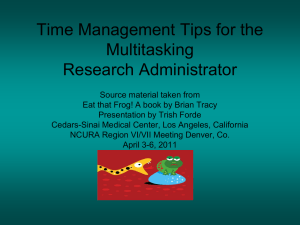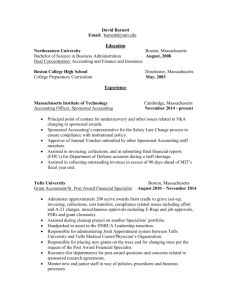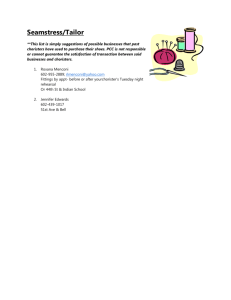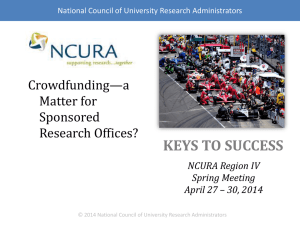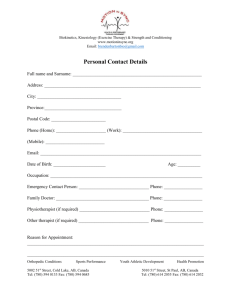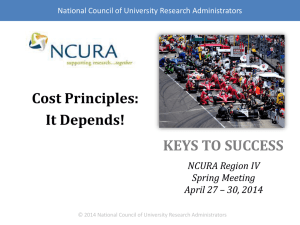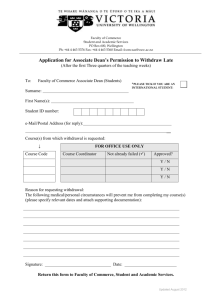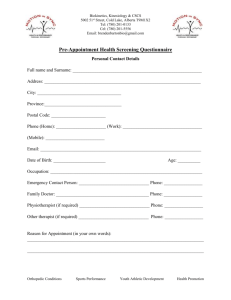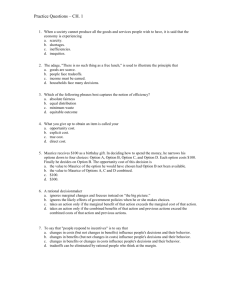Post Award Fundamentals
advertisement
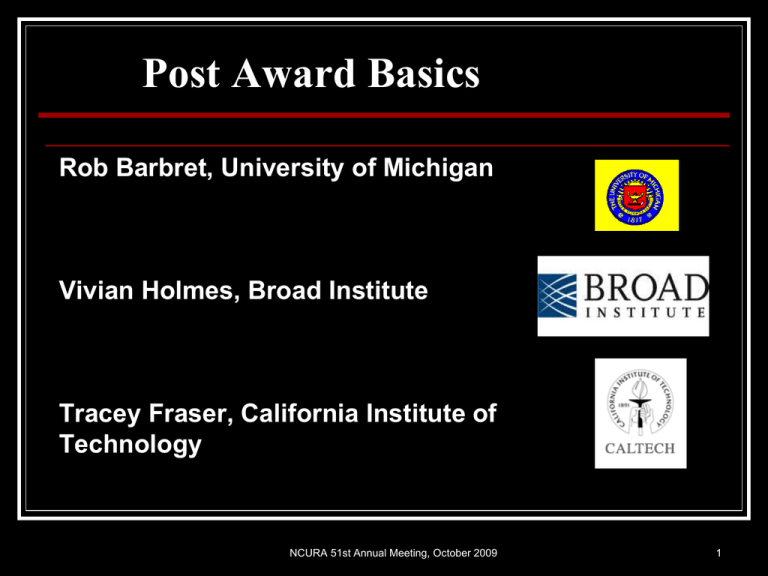
Post Award Basics Rob Barbret, University of Michigan Vivian Holmes, Broad Institute Tracey Fraser, California Institute of Technology NCURA 51st Annual Meeting, October 2009 1 Overview of Workshop The Rules Establishing Accounts Managing Spending on Awards Overview of OMB Circular A-21 Cash Management NCURA 51st Annual Meeting, October 2009 2 Overview of Workshop Collections Sub-recipient Monitoring Cost Sharing NIH Salary Cap NCURA 51st Annual Meeting, October 2009 3 Overview of Workshop Program Income Effort Reporting Close-out of Awards Audits Training NCURA 51st Annual Meeting, October 2009 4 The Rules OMB Circulars A-21 Cost Principles for Educational Institutions A-110 Grants and Agreements with Institutions of Higher Education: Uniform Admin Requirements A-133 Audits of Institution of Higher Education and Other Nonprofit Institutions http://www.whitehouse.gov/omb/circulars NCURA 51st Annual Meeting, October 2009 5 The Rules OMB Circulars A-87 Cost Principles Applicable to Grants and Contracts with State and Local Governments A-122 Cost Principles for Non-Profit Organizations Etc. http://www.whitehouse.gov/omb/circulars NCURA 51st Annual Meeting, October 2009 6 Order of Precedence Award Special Conditions Program Rules Agency Rules OMB Circulars NCURA 51st Annual Meeting, October 2009 7 Establishing New Accounts Type of Awards Grant Cooperative Agreement Contract Gift NCURA 51st Annual Meeting, October 2009 8 Establishing New Accounts Grant Principal purpose is to transfer money, property, services or anything of value to recipient in order to accomplish a public purpose No substantial involvement is anticipated between government and recipient during performance of activity NCURA 51st Annual Meeting, October 2009 9 Establishing New Accounts Cooperative Agreement Principal purpose is to transfer money, property, services or anything of value to recipient in order to accomplish a public purpose Substantial involvement is anticipated between government and recipient during performance of activity NCURA 51st Annual Meeting, October 2009 10 Establishing New Accounts Contract Principal purpose is to acquire property or services for direct benefit or use of the federal government Sponsor determines that procurement contract is appropriate Very restrictive, can have high demands No expectation of cost sharing NCURA 51st Annual Meeting, October 2009 11 Establishing New Accounts Gift A gift from a donor may carry a stipulation as to its use, but there can be no expectation of benefit back to the donor including the technical and financial reports common to sponsored project grants and contracts. NCURA 51st Annual Meeting, October 2009 12 Establishing New Accounts Grant Contract project conceived by investigator agency supports or assists performer defines details and retains scientific freedom agency maintains cognizance unilateral project conceived by agency agency procures service agency exercises direction or control agency closely monitors bilateral NCURA 51st Annual Meeting, October 2009 13 Establishing New Accounts Departments are often frustrated by the time lag between receiving the award and establishing the account. Ideas to speed-up the process Establish check-list for pre-award office Determine what documents are “must haves” and what can wait until after the account is established Send data electronically or via fax whenever possible Train departmental administrators Roles and responsibilities Required forms and documentation NCURA 51st Annual Meeting, October 2009 14 Establishing New Accounts Advance Account Numbers Allow departments to formally request with signoff by Dean Institution will be ultimately liable for expenses if award is not granted Individual institution culture will drive actual funding Pre-Award office authorizes the account based on contact with sponsor Eliminates the need for transfers after the agreement is signed NCURA 51st Annual Meeting, October 2009 15 Establishing New Accounts Only establish a new account if the SPONSOR requires it New accounts are not necessary for each year of the award Spend time training the person establishing the award in the accounting system Understand data elements to ensure: Billing vs. LOC is correct F&A calculation will be accurate based on how the account is established Account Number Structure Prime and Sub Account Relationships NCURA 51st Annual Meeting, October 2009 16 Managing Spending on Awards Reviewing expenditures Establish reasonable practices for reviewing expenditures Does your university review all expenditures or target higher risk transactions? Rebudgeting NCURA 51st Annual Meeting, October 2009 17 Managing Spending on Awards Procurement Cards Clearly define responsibilities: Strong written policy needed What is allowable? Who maintains documentation? Length of time records are to be kept Beware of sponsored projects as default Set dollar limits Audit frequently NCURA 51st Annual Meeting, October 2009 18 Managing Spending on Awards Cost Transfers A cost transfer is an after-the-fact transfer of expenditures from one project to another project. NCURA 51st Annual Meeting, October 2009 19 Managing Spending on Awards Cost Transfers “Transfer(s) must be justified by documentation that contains a full explanation of how the error occurred...” “An explanation that merely states ‘to correct error’ or ‘to transfer to correct project’ is not sufficient.” “It should be noted that frequent errors in the recording of costs may indicate the need to review the accounting system and/or internal controls.” (DHHS Grants Manual) Part II of the NIH policy statement provides guidance for cost transfers on NIH grants, including a 90 day timeframe to complete. NCURA 51st Annual Meeting, October 2009 20 Managing Spending on Awards Cost Transfer “RED FLAGS” Transfers older than 90 days Transfers in the last month of the award or after the award has expired Round numbers!! Explanations that raise more questions than answers. Overdrafts from one sponsored project to another NCURA 51st Annual Meeting, October 2009 21 Managing Spending on Awards Cost Overruns Cost Overruns happen for a variety of reasons Sponsor is slow to send additional year funding Principal Investigator assumes new funds are coming Lack of management of accounts at department level NCURA 51st Annual Meeting, October 2009 22 Managing Spending on Awards Cost Overruns Serious problem that must be managed by the central accounting office Budget cuts of state funds may exacerbate the problem Staff turnover and lack of training in departments can add to the problem Business Managers may fear repercussions if they tell the PI to stop spending Establish a policy and stick to it! NCURA 51st Annual Meeting, October 2009 23 Best Practices on Managing Spending How Overspending is Managed University of Michigan Monthly status reports are sent to departmental administrators A published policy has been established to dictate timing of write off to Dean’s account Overspending not always a bad thing NCURA 51st Annual Meeting, October 2009 24 Best Practices on Managing Spending How Overspending is Managed Broad Institute Overrun reports are distributed monthly OSR administrator reviews with department/lab administrator and/or PI OSR has responsibility for removing/covering deficit; allocating appropriately or moving overrun to discretionary funds NCURA 51st Annual Meeting, October 2009 25 Best Practices on Managing Spending How Overspending is Managed Caltech Very de-centralized Grant managers have access to account information; in addition, central administration monitors Monthly meetings between central and departmental administrators Deficits are (eventually) written off to the department NCURA 51st Annual Meeting, October 2009 26 Overview of OMB Circular A-21 Definitions – Key Terms OMB – Office of Management and Budget Issues principles for determining costs applicable to R&D, training, and other sponsored work performed under grants, contracts and other cost reimbursable agreements with the Federal government. Cognizant Agencies Responsible for negotiating and approving F&A rates and auditing to ensure that institutions are applying cost principles on a consistent basis. Two primary agencies: Department of Health and Human Services (DHHS) Office of Naval Research (ONR) NCURA 51st Annual Meeting, October 2009 27 Overview of OMB Circular A-21 Definitions – Key Terms Direct Cost Facilities and Administrative (Indirect) Cost Can be identified specifically with a particular project, program, or activity of an institution Examples: Salaries, Benefits, Materials, Animal Care Costs, Supplies and Services Incurred for common or joint objectives; cannot be easily identified to a particular project, program, or activity of an institution Examples: Depreciation (Building, Renovations, Equipment), Interest, Operations and Maintenance, Library, Administration costs Allocation Base(s) Common measurable base(s) used to allocate F&A costs Examples: Space (square footage), Modified Total Direct Cost (MTDC), FullTime Equivalents, Salaries and Wages NCURA 51st Annual Meeting, October 2009 28 Overview of OMB Circular A-21 Definitions – Key Terms Modified Total Direct Cost (MTDC) Distribution base consisting of salaries, fringe benefits, materials, supplies, services, travel, subcontracts up to first $25,000 of each Examples of items excluded from MTDC are Equipment, Patient Care , Subcontracts greater than $25,000, and Tuition Distribution Base (Direct Costs) – Major Functional Activities Instruction: teaching and training activities including departmentally funded research Organized Research: research and development activities that are separately budgeted and accounted for including sponsored and university funded research Other Sponsored Activities: performance of sponsored work other than organized research and instruction Other Institutional Activities: residence halls, dining halls, athletics, ancillaries NCURA 51st Annual Meeting, October 2009 29 Overview of OMB Circular A-21 What the Cost Principles Do: Requires that a cost: Be allowable Be allocable Be reasonable (prudent person test) Be treated consistently Be necessary to perform the program Be permissible under the law NCURA 51st Annual Meeting, October 2009 30 Overview of OMB Circular A-21 Allowable Section J of Circular A-21 Currently describes 54 types of costs Alphabetical order For some costs, also specifies approval requirements, documentation and other provisions NCURA 51st Annual Meeting, October 2009 31 Overview of OMB Circular A-21 Examples of Unallowable Costs per A-21 (Cannot be charged against Federal agreements, used as cost sharing, included in service center rates or placed in the F&A cost base) Unallowable Objects Unallowable Activities (Something you buy, a line item) (something you do) Organized fund raising Lobbying General public relations & alumni activities Student Activities Managing investments solely to enhance income Advertising Alcoholic beverages Entertainment Fines & penalties Moving costs if employee resigns within twelve months Certain recruitment costs NCURA 51st Annual Meeting, October 2009 32 Overview of OMB Circular A-21 Allocable • Costs Must be Assigned to a Project (or Cost Objective) in Proportion to the Benefit Received. • • • Actual Allocation on a Reasonable Basis Costs Allocable to a Project may not be Shifted to Another Project to Eliminate Deficits or Other Reasons of Convenience. NCURA 51st Annual Meeting, October 2009 33 Overview of OMB Circular A-21 Reasonable “A cost is considered reasonable if the nature of the goods or services acquired, and the amount involved reflect the action that a prudent person would have taken under the circumstances prevailing at the time the decision to incur the cost was made.” OMB Circular A-21 C3. NCURA 51st Annual Meeting, October 2009 34 Overview of OMB Circular A-21 Reasonable Major Considerations: • Is the cost required by law or within terms and conditions of sponsored award? • Is the cost necessary? • The Prudent Person Test • Consistent with institutional policies/practices? • Would you buy this item and pay this price if you had to personally pay for it? NCURA 51st Annual Meeting, October 2009 35 Overview of OMB Circular A-21 Consistent Costs Must be Treated Consistently in Estimating, Accumulating and Reporting Costs (CAS 501) All costs incurred for the same purpose in like circumstances are either direct costs only or F&A costs only with respect to final cost objectives. (CA 502) NCURA 51st Annual Meeting, October 2009 36 Overview of OMB Circular A-21 Consistent - What Costs are Most at Risk? Clerical and Administrative Costs Office Supplies Local Phone Charges Memberships Postage Equipment Maintenance NCURA 51st Annual Meeting, October 2009 37 Overview of OMB Circular A-21 Consistent - Why is it a Problem to Charge These Costs as a Direct Cost? Each of These Cost Categories are Included in The Departmental Administration Component of Universities F&A Rates (Generally in Large Amounts). Economic Factors May Preclude Doing the Right Thing NCURA 51st Annual Meeting, October 2009 38 NCURA 51st Annual Meeting, October 2009 39 F&A Rate Application On Campus Research Award $100,000 F&A Negotiated Rate 51% Base MTDC Budget: Salaries and Benefits $45,000 Equipment 10,000 Supplies 5,000 Subcontract 40,000 Total Direct $100,000 F&A (75,000 x 51%) 38,250 Total $138,250 NCURA 51st Annual Meeting, October 2009 40 F&A Rate Application Items to Consider: Life of the Award Retroactive Adjustments Your F&A Negotiation Agreement with the Federal Government Sponsored Agreement Terms and Conditions NCURA 51st Annual Meeting, October 2009 41 Cash Management Billing Standardize billing when possible Work with Pre-Award office to eliminate special condition billing and the need to provide back-up with each invoice. Create attributes in the accounting system to allow for meaningful reports to track billing Develop a report to verify ALL accounts have been billed Establish attributes in system to identify frequency of reporting, forms & special instructions NCURA 51st Annual Meeting, October 2009 42 Cash Management Letter of Credit Management Develop a report or system that allows you to draw only up to the award amount and not overruns If possible draw actual expenditures rather than relying on estimates Make sure the reconciliation process for letter of credit accounts is accurate and ties to reports sent to the government NCURA 51st Annual Meeting, October 2009 43 Cash Management Special Considerations Small start-up for profits, venture capitalist Research Agreements include Terms and Conditions acceptable to institution Precise scope of work Clear payment clause Deliverables defined Consistency between clauses Monitor accounts receivable closely Create internal list of “high risk” sponsor’s NCURA 51st Annual Meeting, October 2009 44 Collections Develop or purchase a system to track receivables. Make sure ALL receivables are tracked in the system, including “automatic” or scheduled payments NCURA 51st Annual Meeting, October 2009 45 Collections Reconcile A/R to accounting system on a regular basis If departments must be involved in the invoicing, make sure the central office approves the invoice and establishes the A/R Regardless of who prepares the invoice, make sure all payments are directed to the Central Accounting Office for deposit NCURA 51st Annual Meeting, October 2009 46 Collections The “Send and Hope” collection process is not effective!!! Establish standard dunning notices and send them on a regular basis. Set goals for collections Consider establishing a collection person or team to deal with past due accounts Document everything Develop a plan of attack (e.g. big $ first or small corporations first, etc.) NCURA 51st Annual Meeting, October 2009 47 Subrecipient Monitoring Develop a policy Have clearly defined roles PI Department Central Administration Risk Assessment Educational vs. Industrial vs. Foreign NCURA 51st Annual Meeting, October 2009 48 Subrecipient Monitoring Develop good contract templates Have system in place to monitor appropriateness of invoices Have PI approve invoices before paying Remember that as prime recipient you are ultimately responsible NCURA 51st Annual Meeting, October 2009 49 Subrecipient Monitoring Develop process to review subrecipients on federal awards on an annual basis For all subrecipients on federal awards, verify that an A-133 audit was completed, if applicable Develop a process to followup with a subrecipient if they had any audit findings related to your award Develop a process to provide oversight of any forprofit or foreign subrecipients on federal awards due to the potential of higher risk NCURA 51st Annual Meeting, October 2009 50 Cost Sharing Develop a policy Understand different categories Mandatory Voluntary committed cost sharing Voluntary uncommitted cost sharing Communicate/Train NCURA 51st Annual Meeting, October 2009 51 Cost Sharing Accounting & reporting Separate accounts Same account through object codes Proactive management through out life of award NCURA 51st Annual Meeting, October 2009 52 Best Practices for Cost Sharing University of Michigan Proposal Approval Form (PAF) requires departmental commitment at proposal stage Companion account established at award set up to track cost sharing expenses Policy that ALL quantified cost sharing in proposal is “mandatory” NCURA 51st Annual Meeting, October 2009 53 Best Practices for Cost Sharing Broad Institute Cost sharing must be approved at proposal stage When awarded, it is accounted for separately in its “own” account treated uniformly, consistent NCURA 51st Annual Meeting, October 2009 54 Best Practices for Cost Sharing Caltech Must be clearly identified at proposal stage Cost share account set-up at award initiation Reports available to central and departmental administrators to help monitor if cost sharing effort commitments are on target NCURA 51st Annual Meeting, October 2009 55 NIH Salary Cap Limits the amount of direct salary Pay scale changes January 1 each year Monthly rate – Keep in mind for Academic Year and Summer Salary Have a process in place to track http://grants.nih.gov/grant/policy/salcap_summary.htm NCURA 51st Annual Meeting, October 2009 56 Program Income Definition Gross income earned by a grantee, a consortium participant, or a contractor under a grant that was directly generated by the grantsupported activity or earned as a result of the award. NCURA 51st Annual Meeting, October 2009 57 Program Income Examples of Program Income Income from fees for services performed such as laboratory tests Money generated from the use, sale or rental of equipment purchased from project funds Proceeds from the sale of supplies or equipment purchased with project funds Proceeds from the sale of software, tapes or publications Income from the sale of research materials such as animal models Fees from participants at conferences or symposia Royalties from patents and copyrights What is not Program Income Interest earned on advances of federal funds Receipt of principal on loans, credits discounts or interest earned on them Taxes, special assessments, levies, and fines raised by government recipients Patient care credits NCURA 51st Annual Meeting, October 2009 58 Program Income Proposals NIH requires that program income be estimated at the time of proposal submission In other instances, it is a good idea to determine as soon as possible so it can be isolated. NCURA 51st Annual Meeting, October 2009 59 Program Income Accounting for Program Income Isolate so it can be identified Separate account is ideal Treatment may vary by agency Will be specified in grant/contract May not be addressed in non-federal projects Most Federal agencies require reporting with financial report NCURA 51st Annual Meeting, October 2009 60 Effort Reporting Definition Time and effort reporting is a Federal requirement (OMB A-21. Section J(10)) to ensure that individuals confirm “after-the-fact” any effort they have expended on federally funded activities. NCURA 51st Annual Meeting, October 2009 61 Effort Reporting CHALLENGES Salary Cost Transfers Faculty Work Week Proposal Preparation Costs Appointment / Annual Salary Letters Unclear Effort Reporting Research Faculty What’s in & What’s Out of Effort? 9 Month Faculty NCURA 51st Annual Meeting, October 2009 62 Effort Reporting What’s In What’s Out Research Instruction Administration Service Proposal Preparation (paid from University Sources) Lectures About Specific Aspects of Your Sponsored Project Reports & Articles Related to the Sponsored Project Conferring with Students Working on the Project Attending Meetings Required to Conduct Work on the Project Any Outside Activity for Which Compensation is Paid (or for Which You Would Normally Expect Pay) Outside Consulting Volunteer Community or Public Service Interdepartmental Consulting Sponsor Review Panels or Other Advisory Activities for Federal Sponsors NCURA 51st Annual Meeting, October 2009 63 Effort Reporting Red Flags 100% Effort on Sponsored Projects 0% Effort for PI’s Summer Salary Supplemental Payments NCURA 51st Annual Meeting, October 2009 64 Effort Reporting Issues to Consider: Make sure reports are completed by individual or someone with suitable means of verification Be careful to certify actual effort rather than budgeted amount or payroll charges Manage system to ensure reports are completed in a timely manner to avoid late certifications Consider NIH salary cap as applicable Make sure cost shared effort is included in 100% and certified NCURA 51st Annual Meeting, October 2009 65 Best Practices for Effort Reporting University of Michigan All are required to sign their own certification statement Process is audited and outlying departments are contacted to review process Process handled through Sponsored Programs Office Web based application NCURA 51st Annual Meeting, October 2009 66 Best Practices for Effort Reporting Broad Institute Plan Confirmation System Effort captured via payroll system Monthly certification NCURA 51st Annual Meeting, October 2009 67 Best Practices for Effort Reporting Caltech Effort reports are certified by someone with suitable means of verification (PI or supervisor) Paper reports, developed internally Distributed and collected twice a year Report data comes from Payroll system Reports include information on effort commitments made in award NCURA 51st Annual Meeting, October 2009 68 Close Out of Awards Potential Solutions to Meeting Deadlines Send notices of expiring awards well in advance of the expiration date Create reports to track closing awards Require written request from the department if deadlines cannot be met Develop a close out policy “Freeze” award once final financial report is sent NCURA 51st Annual Meeting, October 2009 69 Close Out of Awards Financial Aspects of Close Outs Departmental Signoff on Final Expenditures Verification of Cost Sharing Verification of F&A Financial Status Report Final Invoice or Draw Fixed Price Agreements Residual Balances Close Account in General Ledger NCURA 51st Annual Meeting, October 2009 70 Close Out of Awards Non-Financial Aspects of Close Outs Technical Reports Property Reports PI Relocation NCURA 51st Annual Meeting, October 2009 71 Best Practices for Close Out University of Michigan 90 Day notice e-mail Appointment follow-up letter Tracking system - metrics Meet with departments NCURA 51st Annual Meeting, October 2009 72 Best Practices for Close Out Broad Institute Closing Notice sent 60 days prior to end of grant requesting close out info or extension request. Monitor changes – follow-up – track invoices Monthly meetings for review and updates NCURA 51st Annual Meeting, October 2009 73 Best Practices for Close Out Caltech 90 day notification Tracking system Monitored by central administration NCURA 51st Annual Meeting, October 2009 74 Audits Central Point of Contact for Audit Coordination Consider policy for audit protocol Make campus aware of who to contact if contacted directly by an auditor What kind of audit is it and who are the auditors? Audit vs. investigation Federal vs. Internal vs. Financial auditors NCURA 51st Annual Meeting, October 2009 75 Types of Audits Pre-award ($1mil or greater) Financial Statement OMB A-133 Program Disclosure Statement F&A Cost Proposal Procurement System Review Property System Review NCURA 51st Annual Meeting, October 2009 76 What Auditors Test For: Allowability of Costs Cost Transfers Cost sharing Effort reporting Program Income Timeliness of Reports Sub-recipient Monitoring F&A rate and calculation Everything else… NCURA 51st Annual Meeting, October 2009 77 Keys to A Successful Audit Central point of contact Organized files Documentation for expenses Appropriate approvals Audit trails Knowledge of policies and regulations Brief staff on audit process and assign a point of contact NCURA 51st Annual Meeting, October 2009 78 Audit Management Don’t assume the auditor has complete knowledge of regulations – they don’t! Understand all auditor’s questions If you are not sure - check it out Don’t ramble or provide additional information – short, concise answers Keep track of questions and responses Always accompany the auditors when they speak to the PI NCURA 51st Annual Meeting, October 2009 79 Training The key to ensuring proper accounting for sponsored projects is training Department administrators MUST be trained in the basics of accounting, OMB circulars, and institutional policies and procedures. Training programs do not have to be elaborate but must be offered repeatedly to ensure that staff is aware of changing regulations Training must also be done for pre/post-award offices NCURA 51st Annual Meeting, October 2009 80 Best Practices for Training University of Michigan Research Administrators’ Instructional Network (RAIN) Research Administrators’ Network (RAN) Customer Service one-on-one training Additional Central Office Training Programs NCURA 51st Annual Meeting, October 2009 81 Best Practices for Training Broad Institute Administrator Orientation and Training New system training External resources such as NCURA; Fundamentals, Neighborhoods, Listserves NCURA 51st Annual Meeting, October 2009 82 Best Practices for Training Caltech Quarterly Research Administrators Forum Just-in-time training for new policies, procedures and systems On-going refresher courses Relaying audit findings and corrective action plans to campus NCURA 51st Annual Meeting, October 2009 83 Web Sites University of Michigan http://www.umich.research.edu/ http://www.umich.edu/~finops/ Broad Institute of MIT and Harvard http://www.broadinstitute.org/ Caltech http://www.caltech.edu NCURA 51st Annual Meeting, October 2009 84 How to Contact Us Rob Barbret University of Michigan Associate Director, Financial Operations 734 764-9593 rbarbret@umich.edu Vivian Holmes Broad Institute of MIT and Harvard Assistant Director, Sponsored Research 617/714-7132 vholmes@broad.mit.edu Tracey Fraser Caltech Senior Director, Financial Services 626-395-2540 tracey.fraser@caltech.edu NCURA 51st Annual Meeting, October 2009 85
